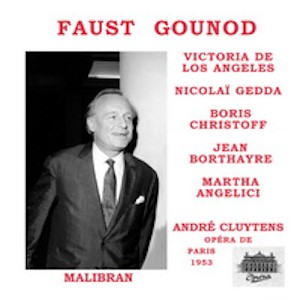
Charles Gounod (1818-1893)
Faust – opéra en cinq actes et six tableaux (1859)
Marguerite : Victoria de Los Ángeles (soprano)
Faust : Nicolaï Gedda (tenor)
Méphistophélès : Boris Christoff (bass)
Valentin : Jean Borthayre (baritone)
Siébel : Martha Angelici (soprano)
Dame Marthe : Solange Michel (mezzo-soprano)
Wagner : Robert Jeantet (baritone)
Opéra de Paris/André Cluytens
rec. 1953
Malibran-Music MR681 [2 CDs: 156]
A casual glance might lead the prospective buyer to assume wrongly that this is the famous 1958 stereo recording on EMI but it is in fact the version made five years earlier with the same three principals but four, different, supporting cast-members. As such, the sound is clear, if slightly peaky, mono – really very listenable; as ever, the seasoned ear soon adjusts, especially in a performance as well sung as this. We must be indulgent and remember that we are listening to a recording seventy years old, made only shortly after the transition from 78s to mono LP and just before stereo became the norm. In any case, it is not by any means so flat; for example, I like the way the acoustic is adjusted to sound more cavernous for the scene in the church opening Act IV where the demons taunt Marguerite trying to pray for forgiveness.
The star of Faust, once by far the most popular and performed of French operas, has fallen over the years but it is still widely encountered. A complete, uncut performance lasts for three and a half hours, as per my preferred modern, digital recording with Cecilia Gasdia, Jerry Hadley and Samuel Ramey conducted by Carlo Rizzi on Teldec, which includes as appendices an extra chorus, discarded “couplets” for Siébel and over sixteen minutes of the Act V Walpurgisnacht ballet music; the aforementioned classic EMI recording omits those and is thus somewhat cut at a few minutes under three hours, and this version under review is only just over two and a half hours – although irritatingly, Malibran does not provide timings, so I have calculated them. The first two Acts are intact and there is a small cut in scene 17 Act III, but otherwise all the cuts are in the last two acts: Siébel’s Act IV exchange with Marguerite has gone, as have the will-o’-the-wisps’ and witches’ choruses, some music in the courtesans’ scene and the ballet – which does not bother me at all. The final prison scene is given complete and is splendidly dramatic; the concluding chorus is thrilling despite the limitations of the mono sound.
This is, of course, a thoroughly idiomatic reading from probably the best French conductor of his era directing a crack French – very French – orchestra with three non-native principals, two of whom possessed great linguistic facility , whereas Christoff’s French is far from idiomatic (though he was a fluent Italian speaker) – and an all-French supporting cast, including three distinguished singers in Jean Borthayre, Solange Michel and Martha Angelici.
My regular readers will know that I have reservations about Nicolai Gedda’s tenor but he is in most youthful and sappiest voice here at only 28 years old, much clearer and open-throated than in later years. He does not have the pharyngeal ring of Di Stefano or Bjōrling but sings sweetly, striking his top C securely in “Salut! demeure”. Christoff is still comparatively youthful, too – not yet forty – and vocally immense, ideally equipped to embody demonic menace. Borthayre is superb: identifiably French in manner, suave and elegant but with a ringing Italianate top. His voice is reminiscent of Robert Massard, the finest French baritone of the next generation after his. Angelici is charming as Siébel. Victoria de los Ángeles,at only twenty-nine years old, sounds purer and more youthful than I have ever heard her, the middle of her voice in particular meltingly beautiful and the top cleaner and more powerful than it became in her later years.
Cluytens directs with verve, power and passion; there are no longueurs when he is charge. On balance, despite its sonic disadvantages, I really would prefer to listen to this over the later studio recording, as everything about it barring the mono sound is superior.
Ralph Moore
Availability: Malibran-Music


















